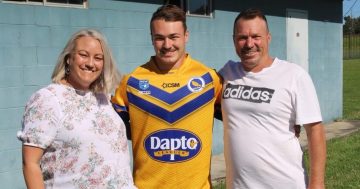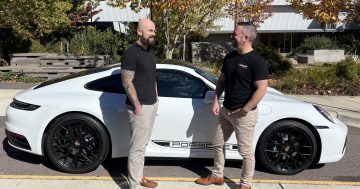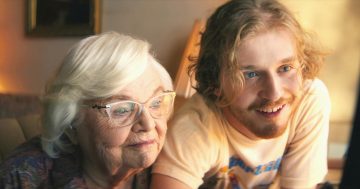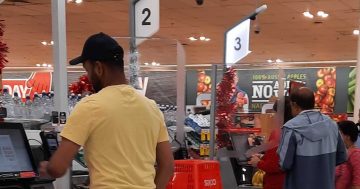
Malika Reese with her son and Stacey Hansknecht with her daughters, the year they were hit by a car. Photos: Supplied by Malika and Stacey.
When Stacey Hansknecht remembers the day she saved her 18-month-old daughter from an out-of-control driver, she feels like a failure.
“I hate talking about that day, it’s like reliving it,” she said.
“I shut a lot of it out. I hate the way I handled myself throughout the insurance case.
“I got run over by a car inside a building and I’m not angry at the driver, I’m angry at myself.
“I know it’s not my fault, but I wish I was the kind of person who could have handled the whole ordeal better.”
It’s hard to imagine how Stacey could have handled it better.
Ten years ago Stacey and her friend, Malika Reese, had their toddlers at a music class on Glebe Street, Wollongong when they heard a car rev.
Moments later it smashed into the studio.
“My 22-month-old son was between the headlights and less than a metre from the bumper,” Malika said.
“We were all in shock.”
The car reversed.
Stacey and Malika ran for their children and gathered them up in their arms when they heard the car rev again.
Malika and her son were thrown through the air, while Stacey and her daughter went under the car.
All four survived, with injuries ranging from a fractured skull, to broken bones, burns and bruises.
Stacey’s other daughter, just three years old, witnessed the crash from metres away.
The driver was 83 years old at the time. Former ballroom dancer Raymond Henry Reeve blamed a “stuck clutch” for the accident in court, although police found no issues with the car.
A year after the accident Reeve received a 15-month suspended jail sentence and was disqualified from driving for three years.
The two women were only at the beginning of their journey for compensation.
“If I was told at the beginning the process I would have to go through and what I would get at the end, I wouldn’t have gone through with it,” Stacey said.
“It was like being run over by another car.
“The experience left me disillusioned about the insurance and medical industries, it eroded my trust in these processes that are meant to help people.
“They just further hurt people who have already been hurt.”
After almost a decade of battling insurance companies for compensation, each woman walked away with about $40,000, and a hefty double-dose of trauma.
The accident didn’t just cause physical injuries, it caused psychological wounds that left them struggling to work and parent.
Stacey said reliving the experience over and over again for doctors, lawyers and assessors meant the trauma remained fresh.
“It’s my honour to wear the physical pain,” Malika said.
“My son would have died if he was hit.
“But the accident took his innocence. I was so traumatised I struggled to be present for him and my other kids.
“We both get really emotionally deregulated at the sound of screeching cars or loud noises behind us.
“Then the way I was treated by the insurance company, I felt like the villain. My story was scrutinised, cut down and minimised.
“Because I’m a creative, I wasn’t entitled to lost wages. Anything wrong with me was because I was a middle-aged woman, not because of the accident.”
Stacey said the appointments she had to attend as part of the insurance process cost her about $200,000 in lost wages.
She was unable to afford to stay in the Illawarra because of the financial impost.
She’s not the same person anymore.
“People used to describe me as the life of the party; a joyful energetic person,” she said.
“Some days I could still be that bright, shiny person and other days I can’t, I get stuck and have so much of that heavy ‘mother- guilt’.
“I cry at the drop of a dime now. I’m shaking and crying just talking about it.
“I don’t care about the money, I care about the time it robbed from me and my family.”
A decade on the two women want to speak out about their experiences in the hopes it might help someone else.
They said the first and most important thing after an accident was to be the first to contact the insurance company.
Next is document everything yourself, immediately.
“Take photos, take video, write everything down,” Malika said.
“You don’t know what details lawyers or doctors will decide are important later.
“Keep all your medical records in one place and have them as up-to-date and accurate as possible.”
The next – and this word of warning is especially for women – forget being a nice person, and find a good lawyer.
“I was so naive going into this,” Stacey said.
“I’d watched too much TV and thought your lawyer was there to be your support person. I had the wrong expectations about the help I would receive.
“Try to find a lawyer who has experience with people who are traumatised, and can be empathetic when you’re distressed.
“Be assertive and advocate for yourself.”
Next, don’t try to do it alone.
Malika said it was important to have a support person with you at appointments to witness and help record what happens.
“Talk to your friends and family, take someone with you to every appointment with a doctor or a lawyer,” she said.
“It stops you questioning your sanity.”
Stacey said not having a support person was her biggest regret.
While they hope no-one has to suffer the way they did, Stacey and Malika say Australia’s insurance system needs an overhaul that reflects feedback from victims who have gone through the claim process.
They would also love to see a support network established for those with similar experiences.
Original Article published by Zoe Cartwright on Region Illawarra.










